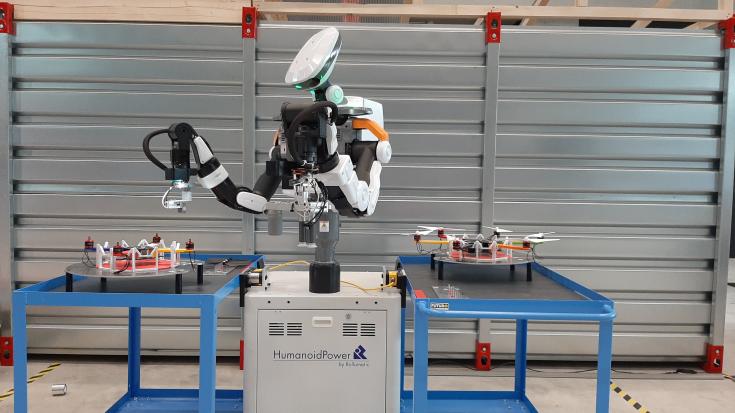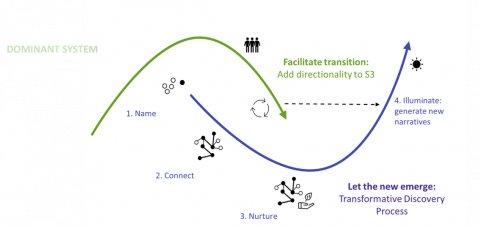The Policy learning week: Research and innovation day

On 16 March 2022; the Policy Learning Platform organised the third day of its Policy learning week. The focus was on Research and innovation and throughout the day we organised different standalone sessions.
Ask an Expert
During the session, our experts Marc Pattinson and Arnault Morisson answered some of the questions sent by the community members on topics that are high on the political agenda of policymakers: Digital Innovation Hubs, university-industry collaboration …they mentioned several good practices from Interreg Europe projects and other Policy Learning Platform resources that can be of inspiration for many organisations across Europe daily involved in delivering policies in those fields. All the sources of information are available in a hand-out.
Travel with us to Biel
Workshop: Implementing S3
Smart Specialisation strategy (S3) is a place-based innovation policy concept to support regional prioritisation in innovative sectors, fields or technologies through the ‘entrepreneurial discovery process (EDP)’, a bottom-up approach to reveal what a region does best in terms of its scientific and technological endowments (Foray, David, Hall, 2011).
Smart Specialisation strategy (S3) requires regions to have a comprehensive understanding of their regional institutional contexts to identify their strongest research, innovation and entrepreneurial assets so that they can select a limited number of priorities where they can build critical mass in areas of comparative advantage. The terms of specialisation can be confusing for policymakers, as the S3 policy concept is not a sector or cluster-like policy concept to reinforce regions in their most advanced industrial sectors, but rather to diversify their economic bases in a smart way, that is, in the most promising areas with the most socio-economic potential (read our policy brief on Smart Specialisation Strategy).
Workshop recording
Workshop agenda
00:00:00 Introduction of the topic and Policy Learning Platform by Marc Pattinson and Arnault Morisson
00:13:00 Keynote speech by Fernando Merida on “main challenges in 2014-2020”
00:28:20 Keynote speech by Elisabetta Marinelli on “The societal grand challenges ahead”
00:53:05 Introduction to second panel by Arnault Morisson and Marc Pattinson
00:55:05 Presentation by Alexandre Almeida on “Crossborder RIS3”
01:17:00 Presentation by Leire Seara on “ The implementation of a sub-regional S3 aligned to the RIS3”
01:28:30 Remarks on good practices by discussant Annamaria Fiora
01:42:00 Concluding remarks by Marc Pattinson and Arnault Morisson
Key learnings
The event foresaw a panel discussion with keynote speakers such as Fernando Martin, JRC Sevilla S3 Platform, and Elisabetta Marinelli, Pr-i: policy-research interface. Participants were also inspired by good practices coming from Interreg Europe projects: the Cross-Border Smart Specialisation Strategy of Galicia – Northern Portugal (RIS3T) identified in the project S34GROWTH, and the Multilevel governance in RIS3 Basque Country, coming from the RELOS3 project.
More detailed information on the sessions is available in a short report.
Some key insights on how to better implement the S3 were shared with participants:
-
For the implementation of the S3, there needs to be shared commitment and trust among stakeholders, which requires consistency in the implementation of the strategy and subsequent policy actions.
-
S3 must focus on delivering transformative regional changes and not focus on low-hanging fruits and quick wins.

-
Regional policymakers must learn to be less risk-averse. Indeed, there is an increasing need to be bold and experiment with new policy tools to address regional challenges.
-
There must be more systematic policy learning regarding good practices that effectively use quadruple helix involvement beyond pilot actions.
-
For the implementation of the S3 at the sub-regional level, it is important to define a clear Territorial Governance Model, to design an inclusive participatory process to participate in common regional projects, to design and offer value-added services and create working groups with businesses, and to empower local stakeholders to act as thematic group leaders and connect to other regional innovation ecosystems.
Future Policy Learning Platform activities
Several follow-up activities were discussed with the participants:
- Regions that are interested to learn from peers to better implement their S3 can consider applying for a Peer Review or online matchmaking from the Policy Learning Platform.
- The Policy Learning Platform offers on-demand expert support through the Policy Helpdesk. Please do not hesitate to reach out to us if you have further questions regarding the implementation of S3 and moving towards S4+.
- Please do not hesitate to contact the Policy Learning Platform to share ideas for policy briefs, stories, topics for online discussions and online workshops.